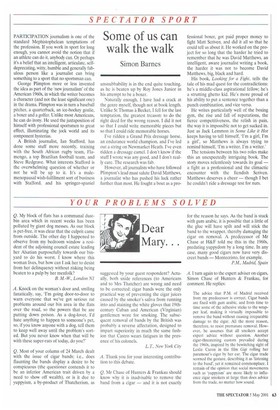YOUR PROBLEMS SOLVED
Dear Mary. . .
Q. My block of flats has a communal dustbin area which in recent weeks has been polluted by giant dog messes. As our block is pet-free, it was clear that the culprit came from outside. The other day I happened to observe from my bedroom window a resident of the adjoining council estate leading her Alsatian purposefully towards our binyard to do his worst. I know where this woman lives, but how can I ask her to desist from her delinquency without risking being beaten to a pulp by her menfolk?
B. M.-W., London NI A. Knock on the woman's door and, smiling fanatically, say, 'I'm going door-to-door to warn everyone that we've got serious rat problems around our bin area in the flats over the road, so the powers that be are putting down poison. As a dog-lover, I'd hate anything to happen to someone's pet, so, if you know anyone with a dog, tell them to keep well away until the problem's sorted. But you never know when that will be with these super-rats of today, do you?'
Q. Most of your column of 24 March dealt with the issue of cigar bands; i.e., does flaunting the bands display a desire to be conspicuous (the questioner contends it to be an inferior American trait driven by a need to show off wealth), or is it due to yuppyism, a by-product of Thatcherism, as
suggested by your guest respondent? Actually, both snide references (to Americans and to Mrs Thatcher) are wrong and need to be corrected: cigar bands were the only practical way of preventing the cigar juices caused by the smoker's saliva from running into and staining the white gloves that 19thcentury Cuban and American (Virginian) gentlemen wore for smoking. The subsequent removal of bands by the British was probably a reverse affectation, designed to impart superiority in much the same fashion that Castro wears fatigues in the presence of his colonels.
LT., New York City A. Thank you for your interesting contribution to this debate.
Q. Mr Chase of Hunters & Frankau should know why it is inadvisable to remove the band from a cigar — and it is not exactly for the reason he says. As the band is stuck with gum arabic, it is possible that a little of the glue will have spilt and will stick the band to the wrapper, thereby damaging the cigar on removal. A predecessor of Mr Chase at H&F told me this in the 1960s, predating yuppydom by a long time. In any case, many good cigars now have very discreet bands — Montecristo, for example.
P.M, Madrid, Spain A. I turn again to the expert adviser on cigars, Simon Chase of Hunters & Frankau, for comment. He replies: The advice that P.M. of Madrid received from my predecessor is correct. Cigar bands are fixed with gum arabic, and from time to time some of the adhesive sticks to the wrapper leaf, making it virtually impossible to remove the band without causing irreparable damage to the cigar. All the more reason, therefore, to resist premature removal. However, he assumes that all smokers accept expert advice without question. Another cigar-threatening custom prevailed during the 1960s, inspired by the bewitching sight of Leslie Caron in the film Gigi rolling her paramour's cigar by her ear. The cigar trade scorned the gesture, describing it as 'listening to the band', yet it remained commonplace. I remain of the opinion that social movements such as yuppyism' are more likely to influence cigar smokers at large than does advice from the trade, no matter how sound.










































































 Previous page
Previous page